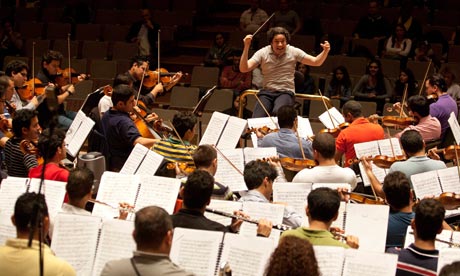
The youth moniker now laid to rest, the garish jackets left in the drawer together with the grandstanding encores, Dudamel and the Simón Bolívars wore white tie and tails for this first concert of their Southbank residency. Performing two of the orchestral works with which Beethoven redefined the idea of music as an art, here was a grown-up orchestra offering themselves for comparison with the world's best.
Yet for all that, the orchestra remains incomparable simply because its young members have grown up together. Their sound is given energy not by grandly conceived notions about the implicit nobility and virtue of the music they play, but by a knowledge, grounded in experience, that this music is creating a new world for them and can do for others.
I have heard more penetrating interpretations of the Eroica than this, but I've never heard a performance in which the symphony's spirit – the embodiment of an idea of man as author of his own destiny – shone through with more brilliance and force. There were moments when Dudamel might have sought to extract more tension – the funeral march sagged, and the extraordinary decrescendo before the finale's last Presto explosion, in which flute and bassoon play chicken with the strings, could have gone further – but the quality and collective precision of the playing still raised the experience far above what is normally achieved with this work.
Dudamel's instinctive virtuosity was better displayed in the Egmont Overture and in Britten's Young Person's Guide to the Orchestra, for which the stage was rammed full of players, including the 14 double-basses whose breathtaking clarity of tone completely overhauled the hall's dry acoustic. The grand opening and the extraordinary controlled collisions in Britten's closing fugue showed Dudamel at his best, just as the solo sections revealed the orchestra's extraordinary depth of talent (as well as Britten's exceptional ear for instrumental colour), giving the entire work a sense of dynamism and urgency I've never heard in it before.
The single encore was a beautifully voiced performance of Elgar's Nimrod – a tribute, Dudamel suggested, to a London audience now firmly part of the orchestra's history. As the ensuing 15-second silence proved, these inspirational musicians have certainly earned their place in ours.

